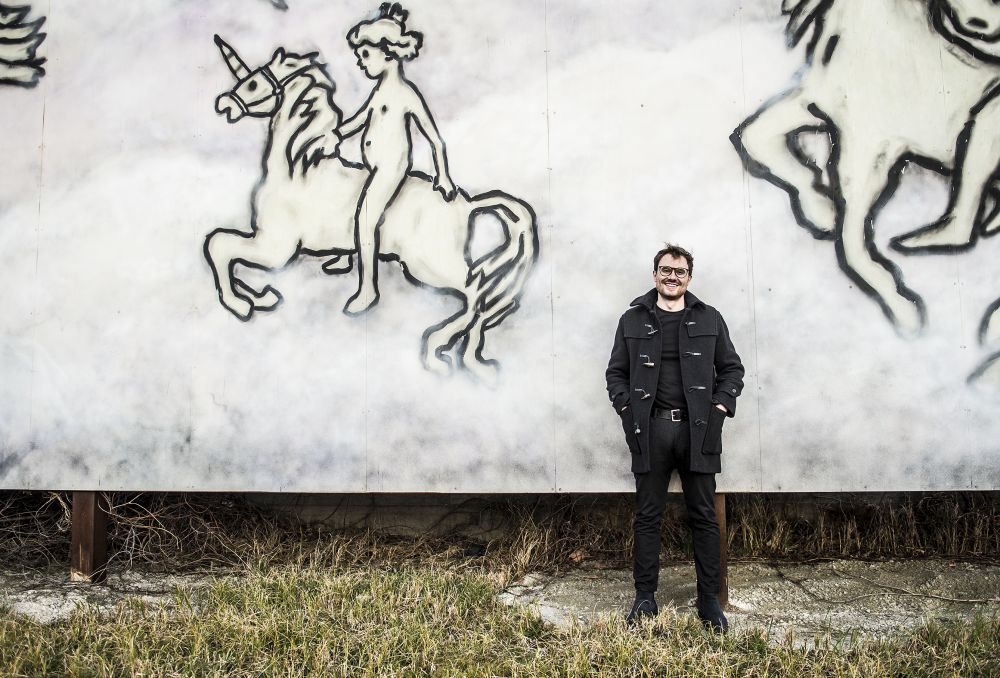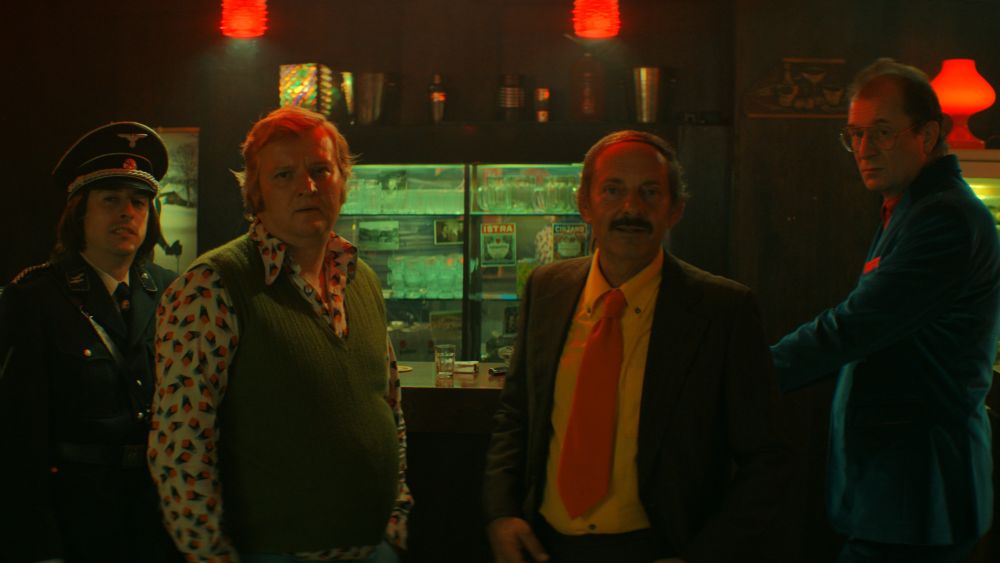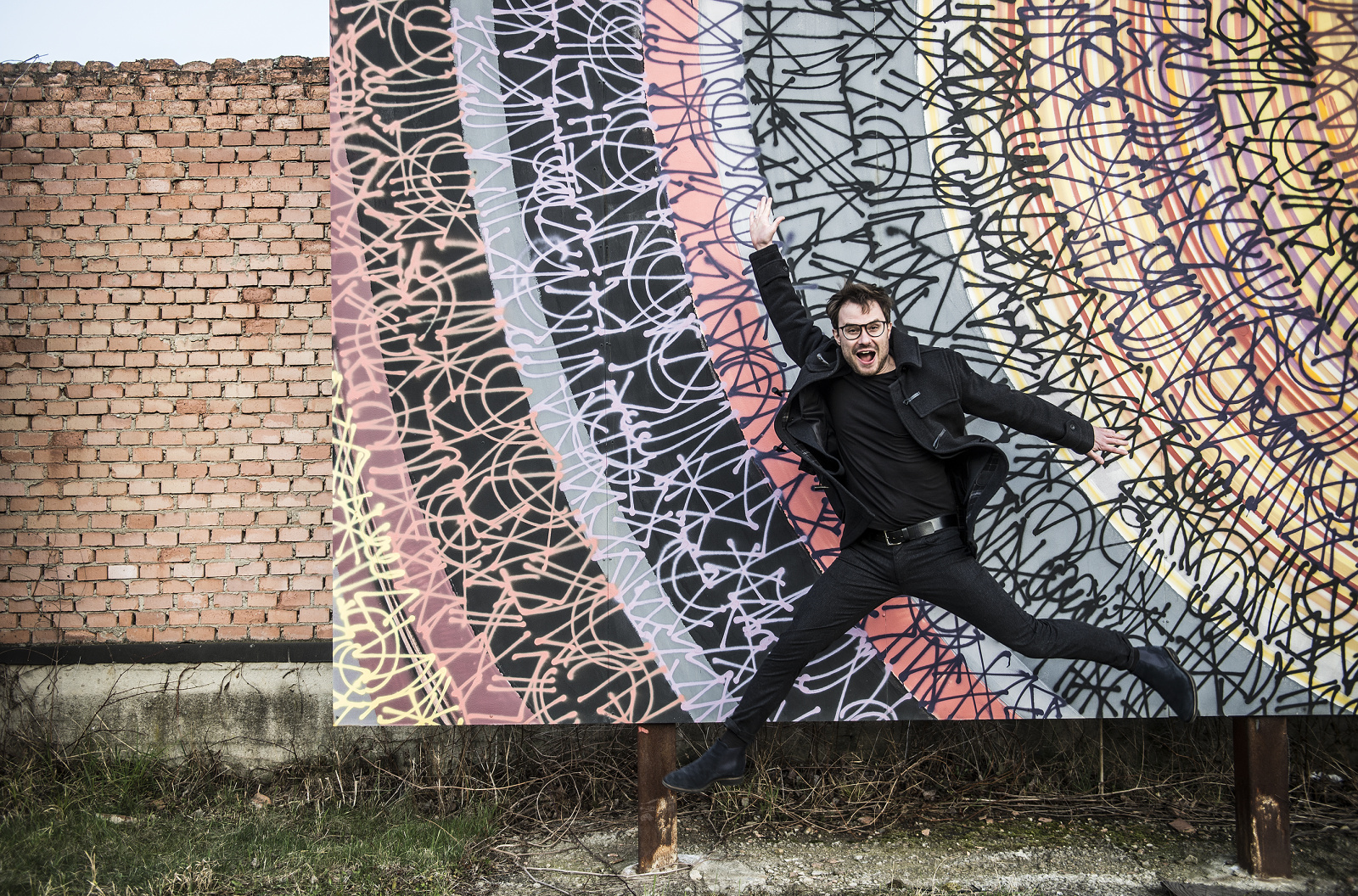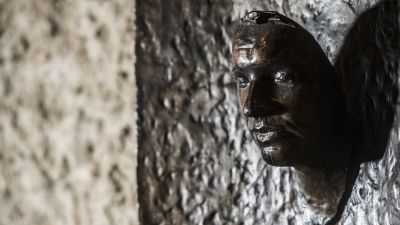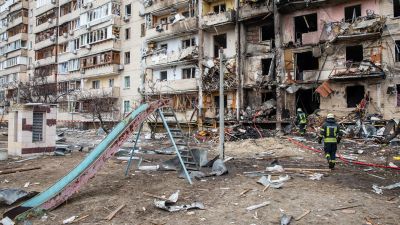The 2021 Czech film Occupation underperformed at the box office but eventually began picking up prestigious awards such the Czech Film Critics’ Prize. Then the Russian army invaded Ukraine, throwing the subject of the movie into high relief. A low-budget film, it became a hit for its timelessness and topicality, picking up a Czech Lion for Vojtěch Mašek and Marek Šindelka, who co-wrote the screenplay. The latter is a Ph. D. student at the Faculty of Arts of Charles University. Šindelka is not only a talented screenwriter, but also a novelist and comic book author. Previously, he won the Jiří Orten Award for poetry and two Magnesia Litera awards for prose.
To borrow words from your heroine in the film, what do you think of heroism?
If we were writing the script right now, I would have a quick answer. The way Ukrainians are facing what is happening to them now, the way they are bravely standing up to Vladimir Putin, and the way their president and other state leaders are behaving - that's a kind of heroism. When we wrote the script, there was no war in Ukraine. We were interested in how the Czechs were dealing with this issue. We had a long discussion about it with the audience after one screening. We talked about the trauma that Czechs carry, how we were damaged by certain events, especially the fact that we weren’t able to stand up to Adolf Hitler and his occupation even though we wanted to. Historian Pavel Kosatík and others see this as one of the key traumas that define Czech identity.
There is similar speculation about what would have happened if we had resisted more in 1968 [after the Soviet-led invasion on 21 August which crushed the period of democratic reforms known as the Prague Spring – ed. note]. We enjoyed toying with what it meant to be a member of a nation that whenever it rose to a level of heroism, it was trampled underfoot or eventually choked that heroism within itself for good measure.
The idea that heroism is a single act that changes everything is nonsense. Often a person becomes a hero by mistake and eventually it becomes a burden. A person is then defined by a single act where they did the right thing. But true heroism should be a persistent process. Heroism can be someone raising their children properly. Such heroes are invisible. They are not celebrated by crowds or processions on town squares. Our film is a bit of a parody of that crowd hysterical heroism.
The theme of the ‘Munich complex’ of the Czech nation is often alluded to in the film. One of the characters in Occupation says that we inherit it from generation to generation. Do you think that is true?
I think we all inherited it. The fact that our allies abandoned us [In the attempt to prevent the war, allies Great Britain and France agreed to the annexation of borderland areas in Czechoslovakia. It proved an ill-fated attempt to appease Hitler – ed. note] has left a terrible bitterness in people. And most of all, the fact that we wanted to defend ourselves against all odds, but couldn't. But it also bothers me how [the betrayal] is also used to excuse everything. Every time it is brought up that we were the ones who were betrayed, and now we can only whine about everything, which is another unfortunate consequence of these events. In Czech culture, including film, the subject is often portrayed in a rather black and white way and examples of unquestionable heroism are sought. We wanted to go against that and make fun of all these traumas, we wrote it as a farce. At the same time, we had a clear idea from the beginning that it was going to be raw and dark, we certainly didn't want to caress viewers with one of those “feel-good” historical films.
When you wrote the script, you based it on a supposedly real event and quite a drastic story. Who came up with the idea of turning it into a film story?
The story came from a mutual friend of Vojtěch Mašek and Michal Nohejl. It's about two tramps who couldn’t come to terms with the occupation in 1968. They came across a Russian soldier somewhere, got him drunk and dragged him to a basement someplace, where they dressed up in Nazi uniforms and put him on fictitious “trial”. The soldier reportedly regressed so greatly that he didn't know what was happening to him, he thought he had really fallen somewhere into the middle of the Second World War. But at that moment the tramps realized they couldn't just let him go. Supposedly, they eventually executed him and buried him under a pile of coal.
It's a dark, horrible story. When Vojta told it to me, I thought it was just a bizarre story, but somehow I couldn't stop thinking about it. I was fascinated by how all the Czech historical traumas came to the fore in one small place. Occupation by Germany, occupation by the Russians - and then two Czech Švejk-like “occupiers” who dig a trap for themselves.
We started talking about it together with the director Michal Nohejl, who was fascinated by the subject. We immediately started thinking what could be done about it. For a while, it looked like it was going to be completely dark. Vojta and I started writing it without any clear ideas of where it would go. Eventually we cast the roles of the two tramps and the project began to take shape and really move forward.
As far as development goes, the whole thing was pretty punk in the beginning. Michal Nohejl had been disappointed that previous big productions had ended up somewhere in the middle because of production issues. He wanted to do this for minimum money, without producers, with actor friends. Almost everyone who worked on the film or starred in it were close friends of Michal who were prepared to do it for almost nothing. Vojta and I said that we would write the script in a weekend - which of course turned out to be unrealistic. As well as that it could be made without money. We needed at least a minimum budget. In the end, the great producers Julie Žáčková and Honza Hlavsa stepped in and made it happen. Even with minimal money, we all jumped in with great energy and enthusiasm.
How did you team up with Vojtěch Mašek?
We've known each other for a long time, we've written scripts for several comics together. He's a great guy to work with. After all the projects we've done together, we've matched our style, we can react well to each other. We complement each other. What I'm weak at, Vojta is strong at, and vice versa.
We debate for a while, then we take the computer and write what we agree on. One of us starts typing dialogue, the other writes it down. Where one finishes, the other follows up smoothly. Compared to prose work, I really enjoy screenwriting, I go to it to relax. Working alone on my own prose text is sometimes a labyrinth. I'm not alone in my pathfinding in scripts, it's liberating.
What if you disagree on the direction things are taking? Who decides then?
Either we eventually convince each other, or we start looking for a third way. It's never happened to us that we hit a point we couldn’t get past, where we would suffer a falling out.
Which of your weaknesses does Vojtěch Mašek cover? Or, where does he help?
From Vojta I learned to work with humour, I'm not so afraid of it anymore. Thanks to him, I understood how to balance the text, how to lighten it in the right place. I have a tendency to delve into things too much, to go into great detail. Sometimes it's a detriment. Vojta is a firework of ideas, sometimes he comes up with a completely unexpected solution, I enjoy it and it helps me not to get stuck in a place.
| This year, Occupation won the Czech Film Critics' Awards for Film of the Year, Best Director, Best Screenplay and the Innogy Award for Discovery of the Year. Czech Lions went to actress Antonia Forman for her role as Milady, again to both writers, and to La Petite Sonja and Hank J. Manchini for Best Music.. |
Was director Michal Nohejl also involved in the script of Occupation?
He consulted with us. We always met over coffee and discussed the possibilities of how to handle certain situations. For example, we debated a lot about the ending. We tried different options.
The stylization of the film is very strong. Did you already write the script that way, or was it the director's idea?
That's more of a director and cinematographer thing. Anyway, while we were working on the script there was already a lot of discussion about the cast, some of the roles were already clear so we could write it with specific people in mind, which always helps. We also knew from the beginning that this was definitely not going to be a classic film about communism. The stylization was supposed to be more dreamlike, more detached from the situation of the time. We wrote it as a universal, timeless story.
From the beginning we also thought about setting it in the present, instead of a drunken Russian it would feature a drunken policeman. But in the end we rejected that because it would have lost one whole level of meaning. But the theme has a timelessness to it, the characters have gotten themselves into such a microcosm. They've trapped each other in a situation that they know they can't just walk away from. They're all a little bit afraid, they're all a little bit guilty and a little bit innocent. They're all trying to get out of it somehow. One bar, one night, one Russian and what to do with him...
The Russian soldier who breaks into the bar is very convincingly portrayed by Ukrainian actor Alexei Gorbunov. You mentioned that he was in Kyiv when you accepted the Czech Lion. Do you know what's happening to him now? Is he defending his country against the Russian invaders?
Alexey Gorbunov is very famous in Ukraine, he is an excellent actor. Michal and the producers wanted a real personality for the role. He played the Russian with great gusto, he leaned into it. There was some miraculous chemistry between the actors, they all got along very well. Otherwise, Alexei Gorbunov should be in Kyiv at the moment. We all hope he's okay. Given his nature, I wouldn't be surprised if he's standing on the barricades there right now.
Would you have written Occupation differently under the influence of current events?
It's quite possible. Today we'd probably write it more like a horror movie. We hesitated for a long time about how to construct the script so that even the current young generation could understand the film. But that turned out to be a completely unnecessary concern. The war in Ukraine began, the occupation is live, there is nothing to explain, suddenly it's here. I believed that this was long over and that this madness had ended with the 20th century. Unbelievable that borders are being redrawn and senseless wars waged here.
In your novel Material Fatigue you dealt with the subject of the refugee crisis. With the war in Ukraine, millions more people have been displaced. Is this a theme that you continue to pursue and elaborate on artistically in some way?
Absolutely. I follow the subject, but at the same time I'm kind of ashamed of following it. Because we've kind of gotten too used to watching everything. And what we don't watch, it's like it's not there. The refugees from the Middle East that all of Europe was dealing with in 2015 suddenly seem to have ceased to exist, which is tragic because those people are still here. It is just that the media has stopped covering them, so they have disappeared from the world for us. First they were overshadowed by the Covid-19 pandemic, now by the war in Ukraine. It annoys me how everything becomes infotainment and a source of daily titillation. The fact is that this has now resulted in a huge amount of aid being accumulated for Ukraine, which would not have happened without the media spectacle.
However, there is something perverse in the fact that we are watching the war literally by the second through the media. The old problems have not disappeared with the new ones. What happened in Syria during the war was insane and at least comparable to what is happening now in Ukraine. But there was only a limited amount of sympathy for Syria. I understand why people were scared, but you could also see the very different attitude of our politicians, who exploited the whole situation and just reinforced people's prejudices, which is terrible.
Saving One Who was Dead film by director Václav Kadrnka is currently in cinemas, and you also co-wrote that.
We have collaborated with Václav Kadrnka before, but none of it came to fruition. When you want to make an art film, the chances of it getting made are not great. But the film was financed. It's Václav's personal story. His dad went into a coma after a stroke, the doctors didn't give him much chance of survival. Václav and his mom came to see him regularly and in a ritualistic way called him back. Which they finally did. Václav kept a diary about it. He decided to make a film based on them. I was approached after he and Jiří Soukup had already worked it out. I brought a different perspective to it. It's a wonderful experience, a typical Václav Kadrnka film, definitely not for every viewer, it flows like Japanese poetry - it's a completely quiet, meditative cinema, the complete opposite of Occupation, which is an energetic film at a breakneck pace.
What are you working on now?
I am struggling a bit now with a play. After some initial hesitation, I went for it and I'm glad I did. It's going well so far. The theme is sexism in schools. But it's far from finished and I don't like to talk about things in the process. I've also had a new novel plotted out for a while now. But I don't want to rush it in any way. I'm allowing myself as much time as I need for it.
You've tried a number of forms from poetry, prose, comics, screenplay, and now you're writing a play. Where do you feel most comfortable?
I'm definitely at home in literature, especially prose. But I'm trying out what I can do and learning a lot along the way. Then I always bring something home to my literature.
| Marek Šindelka |
| Marek Šindelka studied screenwriting and dramaturgy at FAMU and also cultural studies at the Faculty of Arts of Charles University, where he is currently pursuing his Ph. D. in film studies. His dissertation focuses on the films of directors Michael Haneke, Pier Paolo Pasolini and Miklós Jancsó. His first book of poetry, Strychnine and Other Poems, won the Jiří Orten Prize. However, he is currently focusing mainly on prose. He has won two Magnesia Litera awards, the first for his short story collection Stay with Us, the second for his novel Material Fatigue. He is also the co-author of several comic book scripts. He won the Czech Film Critics Award and the Czech Lion together with Vojtěch Mašek for the screenplay for Occupation. |


